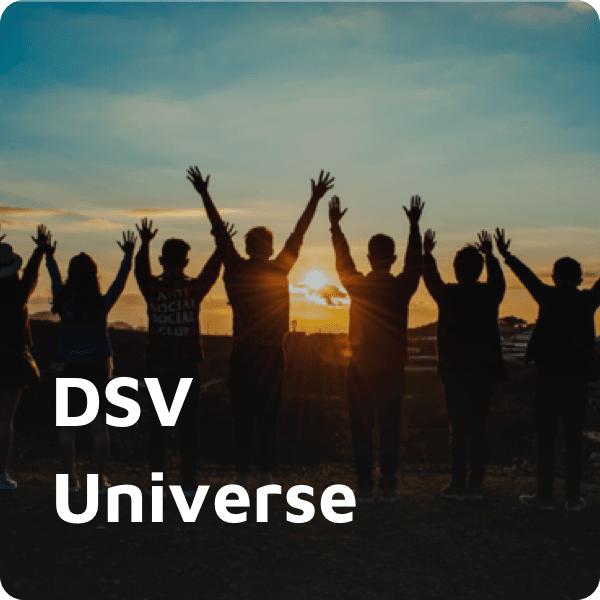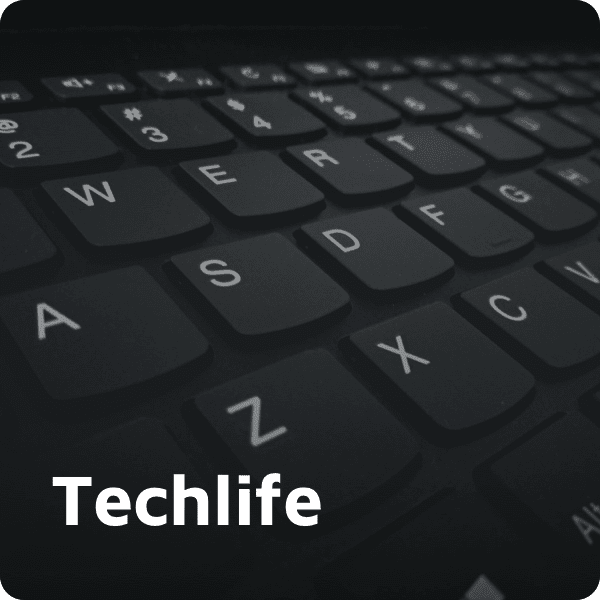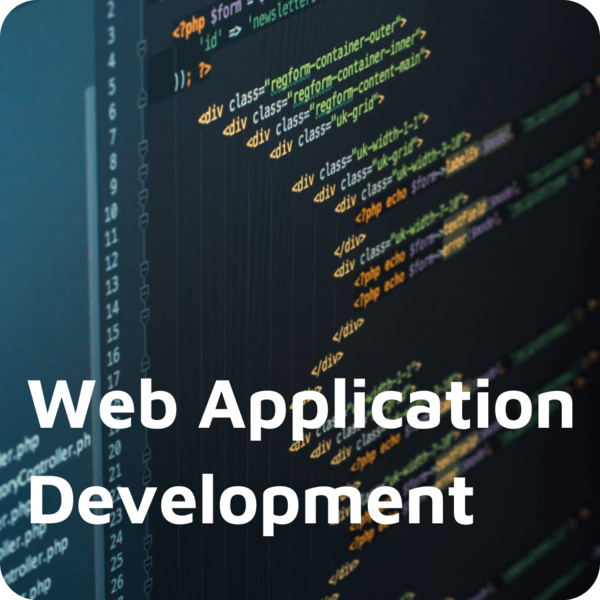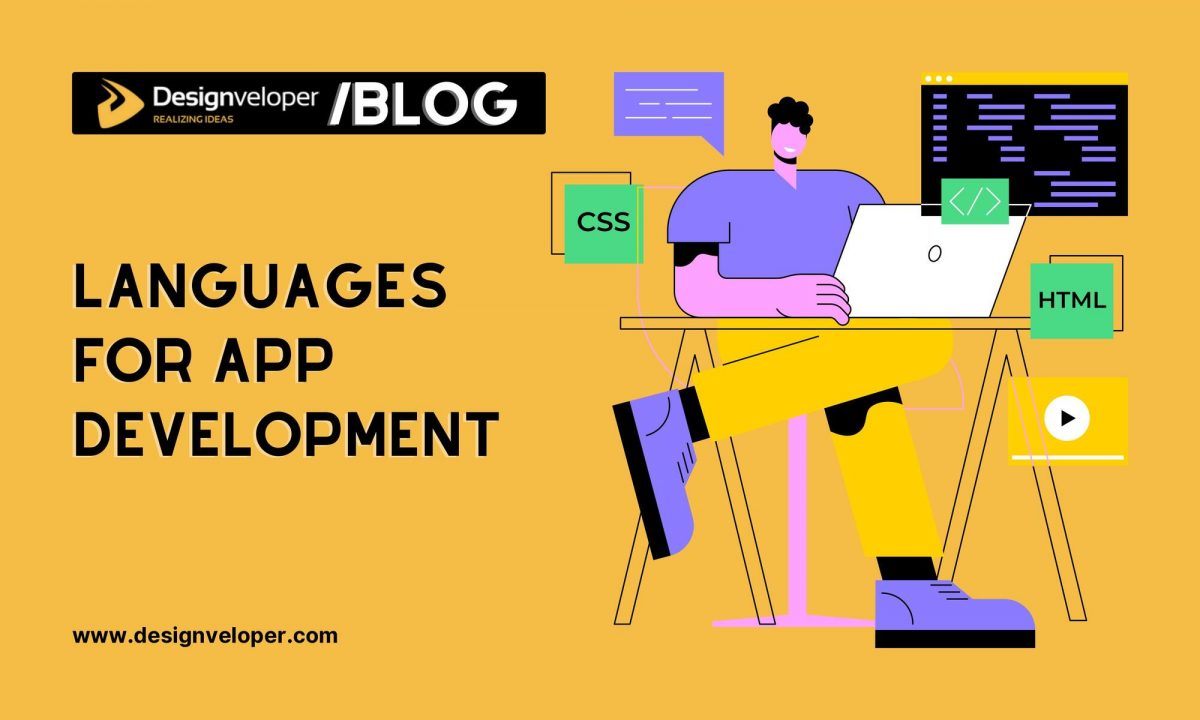While some industries have struggled to operate over the Covid-19 crisis, the gaming counterpart has witnessed a soar in gamers and revenue. This results in the thriving of gaming devices and software, especially smartphone games accounting for the largest market share of more than 40%, followed by console games (28%). No matter which gaming segments you’re about to engage in, game development software tools are needed to build your own game successfully.
What Is Game Development Software?
Game development software includes tools and applications used to make a game across multiple platforms. They cover the following main tasks:
- Viewing 3D models and other assets in advance before they are integrated into the game;
- Tailoring 3D models and other assets for the requested formats of the game;
- Designing levels, virtual environments, and more for the game by the use of level editors.
Today, game-making specialists can develop games using an integrated development environment (IDE) which comprises a source code editor, debugging tools, build automation utilities, and more. But this software is just limited to certain platforms. Besides, most companies, typically Nintendo or Microsoft, now customize game development packages for their in-house games.
Top 8 Game Development Software Tools
Among a plethora of game development software tools in the market, we pick up the most widely used ones for professional game programmers and even beginners. Despite distinct properties and functions, they have some shared features such as ease of use or drag-and-drop interfaces. They all work toward the provision of improved flexibility, adaptability, and innovation to finished products, which betters the gaming experience among end-users.
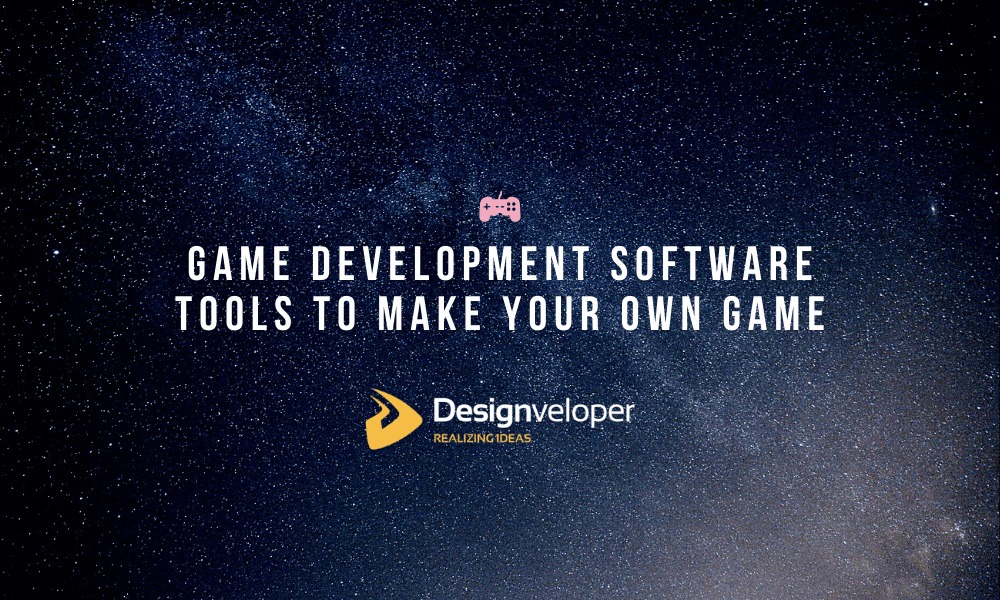
1. GameMaker Studio 2
GameMaker: Studio 2 is the latest version of one of the world’s greatest game development tools. Even when your existing projects are conducted on older variants, you can easily import them outright to this second version without hassle.
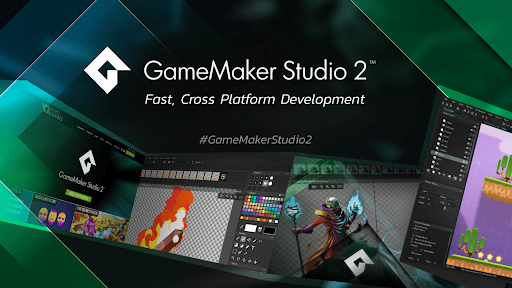
This software is widespread in the creation of both 2D and 3D programs such as multimedia apps, video games, or virtual reality (VR) software. Once you have completed your GameMaker Studio projects, you can launch products on multiple platforms like Windows desktop, macOS, Android, or PS5 without any changes.
Some outstanding features of GameMaker Studio 2 entail:
- Drag-and-drop system for novices;
- Room editor to monitor how objects are organized and draw sprites as well as titles with ease;
- Image editor to create a new brush from any part of your image and ease animation;
- Integration with third-party libraries and extensions to expand the power of your GameMaker Studio products;
- Script editor where experienced developers write codes required to run their games by using the proprietary coding language, GML;
- Real-time analytics to know the geographical distribution of your game’s players, downloads, time used on the game, and so on.
Apart from a free version, GameMaker: Studio 2 now offers users a wide range of subscription packages for different target customers including creators, enterprises, and indies.
2. Unity
Originally developed to support 3D models, Unity is now a robust development tool trusted by both rookie and veteran developers in different industries.
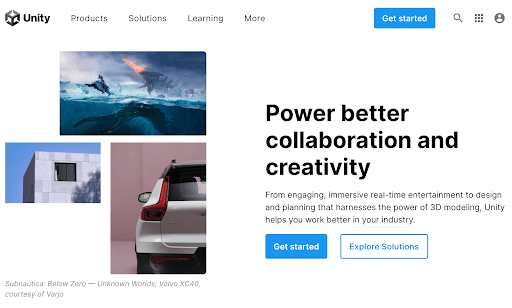
Recommended reading: Creating Cross-Platform Games with Unity and Backend Web Server Using Laravel
In the game segment particularly, Unity has a huge community to assist professional game projects. This game development software is the leading game engine that powers both 2D and 3D mobile, console, and AR/VR games on 25+ different platforms and devices (e.g. Android, iOS, Xbox, or PlayStation). More than 50% of the world’s games are developed with Unity. This is because it provides programmers and designers with powerful tools to turn their concepts into commercial products, typically:
- ProBuilder and PolyBrush for faster level designs and virtual worldbuilding;
- UI Toolkit to resourcefully build extensions and user interfaces;
- Cinemachine, Timeline, Sequences, and other tools to develop beautiful cinematics without coding knowledge;
- Unity’s Universal Render Pipeline (URP) and High Definition Render Pipeline (HDRP) to customize top-quality graphics across platforms;
Also, Unity comes with essential tools to fast develop multiplayer games, write and modify codes for the backend in real-time, measure player behaviors and game performance, as well as boost your game’s growth. Those game assets either are available for free or accompany certain costs.
Manipulations on Unity require an understanding of the NET. system and accordingly the C# programming language. In terms of subscriptions, Unity’s development team offers three solutions for indies, mid-market studios, and enterprises.
3. Godot Engine
Godot is the first free-of-charge gaming tool on this list. Therefore, this software calls for donations for its quality improvement and the faster progress of Godot-based projects. Godot users may download all essential source codes and modify them according to their demands.
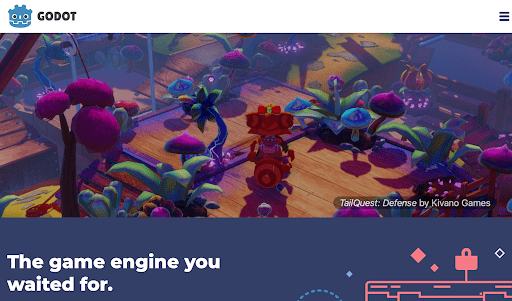
The engine’s open-source nature doesn’t translate to its inferior features. Conversely, Godot still offers a large collection of game assets to develop both 2D and 3D games imported to different platforms (e.g. Windows, Linux, HTML5, or macOS). Thereby, Godot allows game developers and artists to:
- Build creative designs with a visual editor, built-in nodes, and content-building pipelines;
- Create impressive 3D visuals in real-time with Principled BSDF, mid and post-processing effects, etc.;
- Develop 2D games with tilemap editor, 2D lights and normal maps, etc.;
- Animate all objects without hassle;
- Test games easily with already built-in debuggers;
- Access GDScript, Godot’s native scripting language that resonates with Python, to build games with ease;
- Receive community support for different programming languages (e.g. C++, C#, Rust, or Kotlin);
- Join multi-channel community forums.
4. Unreal Engine 4 (and Unreal Engine 5)
Represented by Epic Games, Unreal Engine is regarded as the world’s most advanced tool to develop 3D products in real-time. Compared with other game engines, Unreal Engine has a steeper learning curve, hence the company provides game developers with free online tutorials, webinars, Q&A section, and even community forums where they may discuss with other professional fellows.
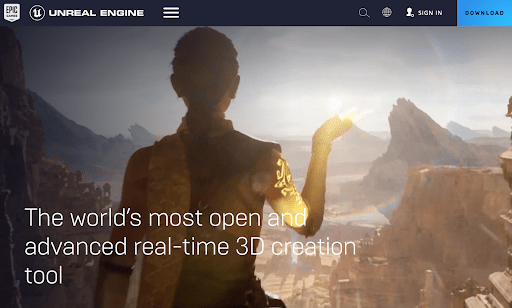
The game development software is now accessible in Version 4. No matter which licensing options (i.e. Standard, Custom, or Enterprise), Unreal Engine still affords all features and tools to create AAA-quality products across PC, mobile, console, or AR/VR. Some impressive features of UE4 consist of:
- Visual Dataprep that enables you to import the raw data from your source application and modify such assets as per your requirements without hassle;
- Animation Blueprints that help develop and manage complicated animation behaviors and actions;
- Advanced AI technology that can be built with your characters or any entities;
- Full support for media elements such as sounds and videos at any resolution level;
- Free access to C++ source codes and API.
The company introduced the beta UE5 in May 2021 which incorporates new features such as Nanite, a virtualized geometry system, and Lumen, which supports the creation of dynamic scenes.
5. Defold
Defold also remains free for developers as Godot. But they are required to achieve the free Defold License which empowers them to commercialize, modify and distribute Defold games. So the game engine hinges much on community donations and corporate sponsorship to render the software and its game projects sustainable.
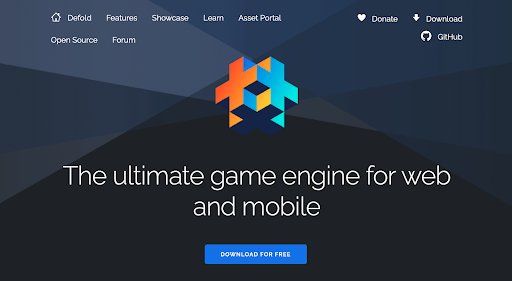
Defold shows no difference from some mentioned engines on this list. Particularly, its features are optimized to make cross-platform 2D and 3D games from scratch, involving:
- 2D sprites, spine models, and tilemap editors for 2D levels;
- 3D models and mesh to build and adjust 3D geometry at the execution time of deliverables;
- A sturdy animation system comprising flipbook, spine, and property animations;
- Designer-friendly GUI and scene editors;
- Advanced physics simulations;
- Defold SDK that facilitates the integration of extensions outright to the engine. Such additional features can be written in C, Objective-C, C++, JavaScript, and Java;
- Lua programming language for codes and scripts.
6. RPG Maker MZ
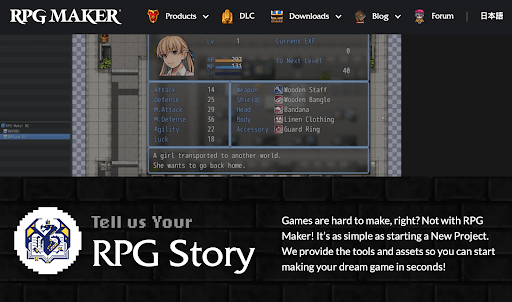
If you’re looking for a powerful role-playing game engine with story-centric factors, RPG Maker will be a decent option. Of which, RPG Maker MZ is the latest version that accompanies updated features to best support existing ones. Accordingly, game developers can:
- Build a map with a Map Editor and a massive number of new tiles;
- Use available characters, import your own characters, or build original ones with a Character Generator;
- Approach the largest trove of game assets including face graphics, map chips, sounds, and more;
- Store valuable information in the included Database;
- Test your game at runtime with a Test Play function;
- Use the Event system to create an array of events without coding knowledge;
- Utilize an open-source tool called Effekseer to build impressive 2D and 3D animations in no time.
Compared with other game development software tools, RPG Maker MZ supports fewer platforms, particularly Windows and macOS.
7. Cerberus X
Cerberus X is a free game engine for mainly 2D creation. But you can create 3D appearances for your games thanks to some third-party 3D modules available in the engine and full access to the OpenGL graphics API (for both versions 1.x and 2.x).
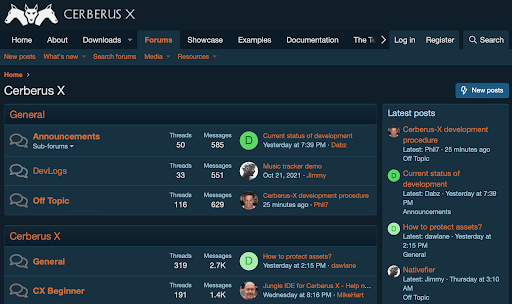
Together with the strength in 2D support, Cerberus X offers a series of powerful APIs and the Mojo lightweight framework that empower you to import other developers’ source codes to your existing projects or devote your codes to others. So Cerberus X games don’t demand much of your coding to develop a functional game. One outstanding feature of the software is its Light system which assists in the fast building of normal maps, lights, and shadows, and its compatibility with the 1.x version of the OpenGL graphic interface.
Cerberus X’s supported systems are fairly diverse, including Windows, macOS (up to 10.15.x), Linux, Android, iOS (13.x or later), and HTML5. The engine is free but you can financially support the tool’s developers by naming your subscription.
Recommended reading: iGaming Website Design: Anti-Money Laundering Guidance
8. Construct 3
A big name in the 2D game-making segment for its shallow learning curve and drag-and-drop functionality that allows those without programming skills to build high-fidelity games.
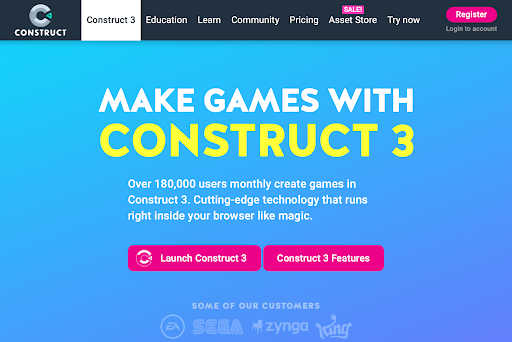
One distinguishing feature of this tool is developers can either develop gaming products directly on a browser (i.e. Google Chrome, Firefox, Safari, and Microsoft Edge) or download the software to their devices for even offline work. Having said that, programmers can self-create JavaScript codes and scripts.
This tool facilitates your game-making experience with ready-made features, typically the Timeline animation function to build sequences of events. What’s more, the tool accompanies other built-in components such as collisions to tailor collision polygons, tilemaps, physics engines, and more.
Apart from free game assets available in this tool, users can access the Asset Store to buy advanced features from other authors in terms of animations, fonts, and more.
Should We Utilize a Professional Team or Use Software?
Apart from game development software, your company may look for a professional team for your game projects. However, the better option depends mostly on what you want to achieve from a final product and how the game is designed and deployed.
Some companies use their internal human resources to develop games with available game engines. Their game development projects can be conducted at a small scale and require limited expertise to handle related tasks seamlessly but still guarantee the top quality of products.

However, this doesn’t hold true for most gaming studios, regardless of their capitalization, at the present day. Even when the biggest game studios make huge investments in gaming development experts and custom game engines for game production, they need to recruit tons of external small teams to cover different aspects of projects. Looking at the closing credits of the famous game Assassin’s Creed 2, you’ll see the engagement of outsourcing professional teams in art, sound effects, and more, besides the Ubisoft Annecy’s teams.
Developing a game may become easier with the support of game engines. But there’s still a need to partner with outsourcing teams to handle tasks your company is incapable of, say, concept specialists who develop ideas suited for your business operations or game designers who build unique characters, objects, and more based on such concepts.
Meanwhile, game engines help developers and artists incorporate all custom features, sprites, and functions in a faster way. Therefore, having a small professional team in charge of some project tasks is advisable to guarantee the good quality of final products.
Wrap Up
With this latest technology now available, it is a much better option for you to switch to Designveloper. We offer all of the services needed for any size business and more – from web development, mobile application design, and consulting. We are here waiting for your call! Give us a call today if you want an estimate or just some advice on how we can help your company with these new developments in technology!






